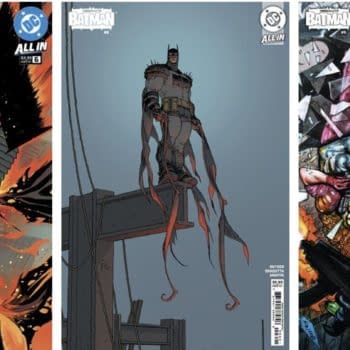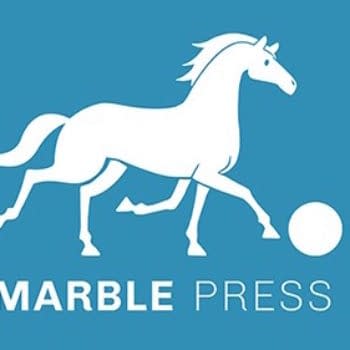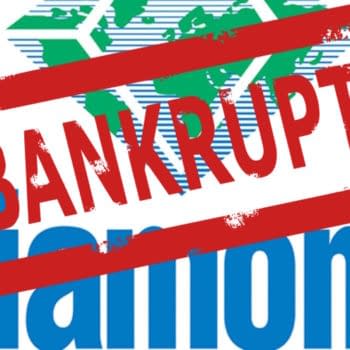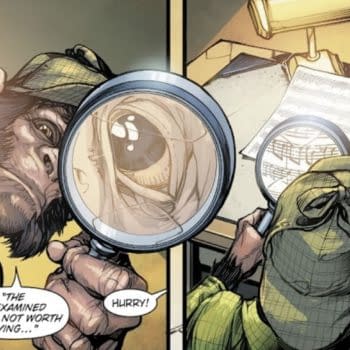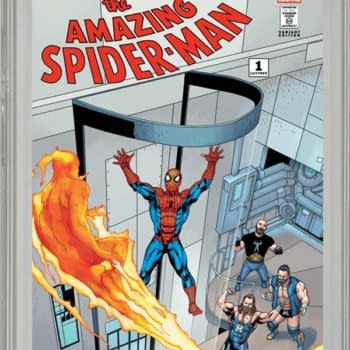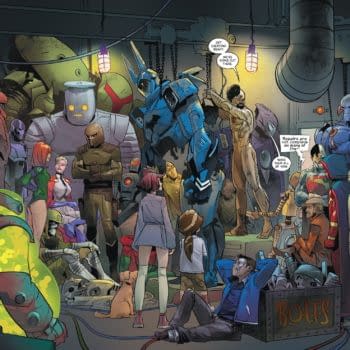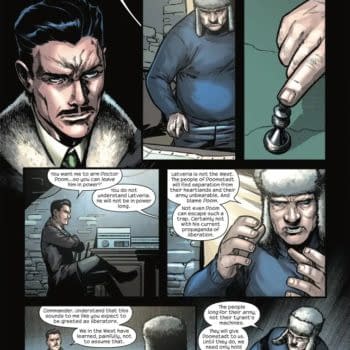Posted in: Comics | Tagged: cancer, jim starlin, Joe Martino, Mar-Vell, Marvel Comics Captain Marvel, superheroes, The Mighty Titan
Death Of A Hero
Back in 1983, I penned an article lamenting the death of Marvel Comic character Captain Marvel, who was killed in Marvel's first graphic novel, The Death of Captain Marvel by Jim Starlin. At the time, Marvel (and Starlin) were savaged by fanboy critics who not only completely misunderstood what was being done, but railed against the way it was being done.
At that time I penned the article (for Comic Collector) I was profoundly moved by the book, and felt then (as I still do today, 30 years later) that the book had weight, and deserved a second look, which I gave it in the following article, which is presented essentially as it was originally printed (albeit with some minor editing).
**********
It's all over now…even the shouting. Captain Marvel is dead, and there is no changing that. No 11th hour reprieve. No writer to revise him in a later issue. He's gone, and that is that. All we have now is the leftover wine, and its bittersweet taste. There are those among the fan-elite who have reduced this tome to so much Pop Psychology and trite nonsense. Yet to do so just to maintain an aura of feigned intellectualism in hopes of impressing the masses of fandom is not only unfair; it is outright criminal.
As a writer and a person, I have two illusions in life; one is grand and terrifying, and the other is dark and fascinating. Together they form the basis of my beliefs and philosophies of life and truth. Still, Jim Starlin, with his finely-crafted work cuts through all of this and exposes the core of my being with his own mysteries that are more fascinating and awesome than I could ever hope to imagine.
To Starlin, death is a reality. It is not something that only happens to the other guy, it is a part of life, it is a measure of the truth, and everybody is touched by it, one to a customer, with no exceptions. Rich, poor, old, young, coward, hero, it does not matter, we all die, and not always in the manner or fashion that we would expect or prefer.
The Vikings of old believed that the only way for a warrior to enter Valhalla — the place of the noble dead — was to die with one's sword in one's hand. Cavalrymen of the American West wished to die, "with their boots on," that is to say in battle. The Indians of America refused to fight at night for fear that the Great Spirit Wakanta would miss their souls in the dark. Warriors the world over, throughout history have sought to die "With Honor" (as witnessed by the death of General Sam Sawyer in Captain America #274). After reading The Death of Captain Marvel, I cannot help but to feel that this attitude is so much horse manure. When I die, I would wish to go out as did Mar-Vell, surrounded by my family and friends.
Noted psychologist Elisabeth Kubler-Ross wrote extensively about the death experience, and she broke it down into five stages: denial, depression, anger, bargaining, and finally acceptance. Starlin has Mar-Vell move through each of these stages as he approaches his end. This is not Pop Psychology, but a man, who has spent his entire adult life as a warrior fighting near-impossible odds, now he has come to find out that a disease will strike him down. Even more than that, there is nothing that he can do to stop it. Mar-Vel is a man who loves life even more than honor (that which he as a warrior has been taught to love). Now he must face death as it slowly creeps up on him.
Starlin stalls this moment throughout the book by always tempting the reader with the possibility that Mar-Vel will live, in spite of what we all knew would happen. Therein, he manages to sustain the suspense of the book for the reader is always teased by the thought that no company would really kill off a major character, yet even though another company (DC) actually did kill off a major character that "would not be killed off" The Batman of Earth 2.
When he died, fandom was enraged. Many fans felt that he should have been killed in an annual or something (needless to say Marvel was criticized for doing just that…making a big deal over Mar-Vell's death…sometimes you can't win for losing). The death of Earth 2 Batman was proclaimed as both stupid and wasteful, well, it was, but not for the reason that many claimed.
When you think about it, is it not stupid and wasteful to die? Batman spent his entire adult life fighting crime, and then he died doing the same. He spent most of his tenure as a crime fighter putting away nameless criminals and finally one of them put him away. Elysius, Mar-Vell's lover, confessed to him that she always feared that he would someday die in some lonely place, surrounded by his enemies (what Batman of Earth 2 in fact did). Dying in this way (at home in bed), at least she could be with him. It is this that is stupid and wasteful about death; to die in some meaningless gesture at the hands of some cheap thug. Batman's death was cheap and pointless, but it was meant to be. Writer, Paul Levitz was making a statement about superheroes and their lives, only no one understood the message…pity.
Still again, had Mar-Vell been given the choice, he too would have gone out as had the Batman. The desire among warriors to go out in a blaze of glory is great indeed. Yet more than that, Mar-Vell would have rejected death, he would have fought to the very end, denying that it was even possible for him to die. When Thanos asked if Mar-Vell would he, "…Challenge the abstract…deny the infinite?" Mar-Vell replied, "Yes!" but why?
Why indeed? In the award-winning television show M*A*S*H, Colonel Henry Blake (McLean Stevenson) was consoling Hawkeye (Alan Alda) over the death of one of Hawkeye's friends. "They taught me two rules in command school," Blake said. "Rule Number One is that young men die. Rule Number Two is that doctors can't change Rule Number One." Personally, I can't help but to believe that the man who attempts to deny the infinite is both a fool and tilting at windmills greater than those against which Don Quixote fought.
It is only human nature to deny death, especially one's own. Yet we understand that when a study was made, it was discovered that we "need" death. According to what we heard, a number of years back several people were hypnotized into thinking that they would not die. They all promptly lost the will to live. That is to say that they no longer had a real reason to do anything…today. It was subsequently determined that death adds immediacy to life. For if one has forever to live, then one also has forever to do whatever one wants…so why do it today?
Death is as much a part of life as is living; to ignore one is to reject the other. Perhaps those who panned The Death of Captain Marvel were more upset about Jim Starlin's message than the way he packaged it. Unable (or unwilling) to deal with the former they ripped apart the ladder…mores the pity.
The Death of Captain Marvel is a powerful and important piece of literature, well worth both the purchase price and the time spent reading it. All that is now left to say of the Kree Captain, by way of a eulogy is to paraphrase George Harrison, "Mar-Vell is a dead man…miss him…miss him."
**********
We wanted to reprint this article now, especially given that we recently learned that two other comicbook superheroes are stricken with cancer; Joe Martino's The Mighty Titan, and Michael Jan Friedman's hero, The Salamander from his upcoming prose superhero novel, I amThe Salamander. Unlike the megalomaniac, costumed, characters in most superhero comicbooks, cancer is a real thing, just ask Joe Martino, a comicbook writer and artist and the father of three who has survived kidney cancer twice.
Personally, we live in the real world and (in spite of what some believe of us) only play in the world of spandex-clad superheroes. We understand that cancer is a real thing and understand its real-world implications. What Martino is doing with The Mighty Titan is attempting to use what he knows and experienced via his own (and others') cancer experiences, and (possibly) entertain and teach them what that was all about.
Needless to say, Martino is (like many of the rest of us), a Heroist — someone who believes in the cult of heroes — and has determined to wrap his tale in the fictional world in which he grew up, one that is filled with men and women wearing masks and capes, and truthfully, there is nothing wrong with that.
__________
Robert J. Sodaro who is something of a Heroist himself, has been reviewing comicbooks for some 30 years. During that time, his reviews and articles have appeared in numerous print publications, as well as on the web







